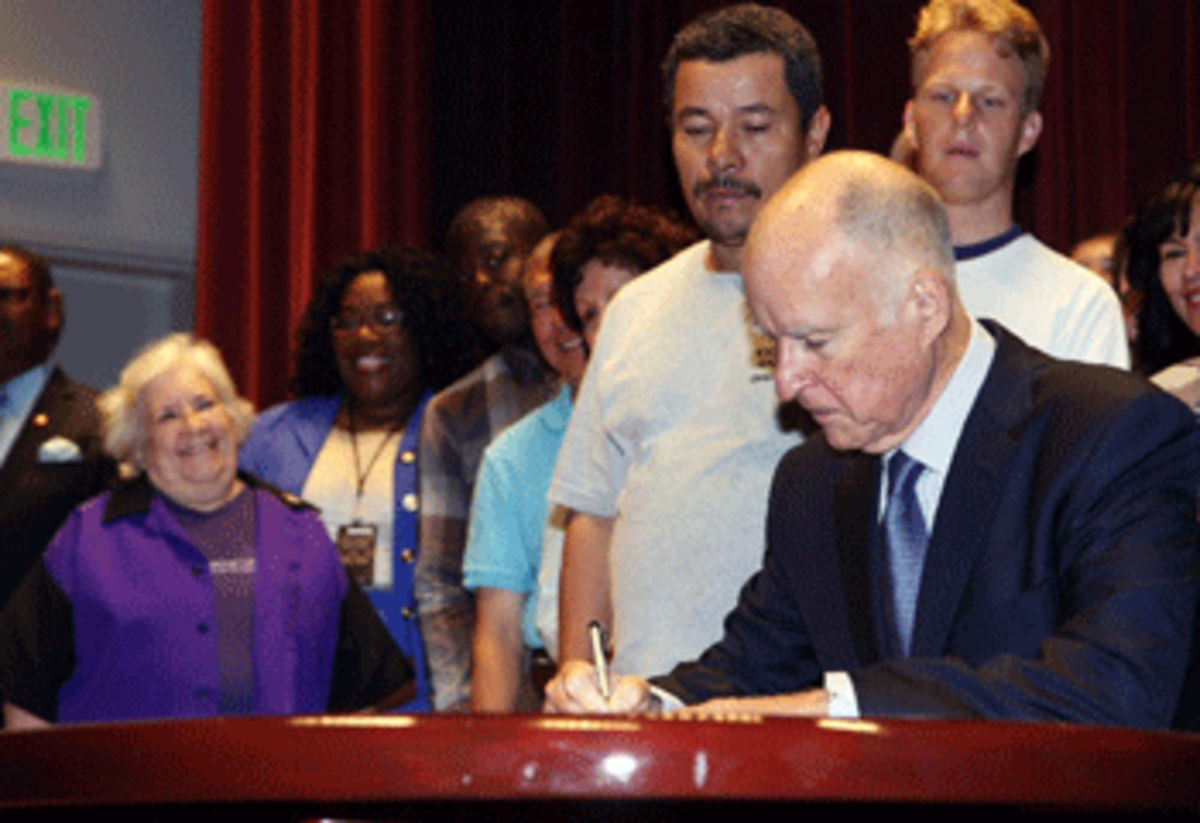Governor Brown Signs Historic Minimum Wage Increase
By

Imagine having to choose between buying soap for yourself or diapers for your baby. Or being forced to walk miles to work because you chose breakfast over bus fare. Or being left with no choice but to go to the local food bank in order to feed your family. These are the harsh realities that millions of low-wage workers in California face every day. But fortunately for them (and for our state as a whole), their future just got a lot brighter.
Wednesday morning, Governor Brown made history by signing AB 10 (Alejo), a sorely-needed and long-overdue wage increase for California’s lowest-wage workers that passed through the Legislature with strong support from the California Labor movement.
To commemorate the momentous occasion, Gov. Brown held two special press events today. At this morning’s event in Los Angeles, Gov. Brown and Assemblymember Luis Alejo were joined by a group of local car wash workers, and the Oakland bill signing event this afternoon was filled with young men and women enrolled in the pre-apprentice program at the Cypress Mandela Training Center.
Governor Brown:
Our society is experiencing a growing gap between those at the top and those at the bottom. Our social fabric is being ripped apart. Today, we sew that fabric a little tighter together, as we raise the wages of those who labor at the bottom … This is an important step to raise the floor, even as the floor and ceiling get farther and farther apart. So today we’re celebrating something very important: we’re taking a step, through our state Legislature, to give back to those who work so hard but get the least amount of compensation.
Yaveth Gomez, a college graduate who received a degree in Film Studies from UC Berkeley in 2009, now works as a dishwasher at a restaurant and earns $8.50 an hour. He shared his personal story about being forced to go to the food bank when he couldn’t afford groceries, and said
I believe this minimum wage raise is going to help a lot of people. $8.50 is really not enough for us.
The statewide wage increase comes on the heels of San Jose’s monumental minimum wage ballot measure, passed in 2012, which increased the city’s wage to $10 and proved that raising the wage has a positive and simulative effect on the economy.
The new statewide minimum wage will be implemented in two steps; increasing from $8 to $9 per hour in July of next year, followed by another one-dollar increase to $10 in January of 2016.
By providing an estimated $2.6 billion in additional wages to the state’s lowest-paid workers, California will reap $1 billion in new economic growth as +workers spend their increased wages, and job growth will expand as businesses hire to meet the increased consumer demand. (Learn more about the benefits of a $10 minimum wage.)
Assemblymember Luis Alejo, the sponsor of AB 10:
This [minimum wage] bill got a lot of
momentum at the beginning of the year, when President Obama called for
raising the federal minimum wage. The President supports it, the
American people support it across the country, and yet our Congress has
failed to act. But California is often the vanguard for the rest of our
nation, and we’re always leading the way to strengthen and building our
middle class – and this [new law] is an example of that. Today it’s
California; tomorrow it’s going to be many other states that follow in
our example.
Written by Rebecca Band

California Labor Federation Executive Secretary-Treasurer Art Pulaski:
Today’s bill signing affirms California’s role as leader in supporting low-wage workers. This is a historic day for all Californians, as we now have the highest minimum wage in the country.
While this is an important victory and a huge step in the right direction, our fight for a living wage for every single California is far from over. We will continue to work tirelessly to ensure all California workers earn enough to support their families.
Rebecca Band
Labor’s Edge
Wednesday 25 September 2013
No comments:
Post a Comment
Please leave your ideas